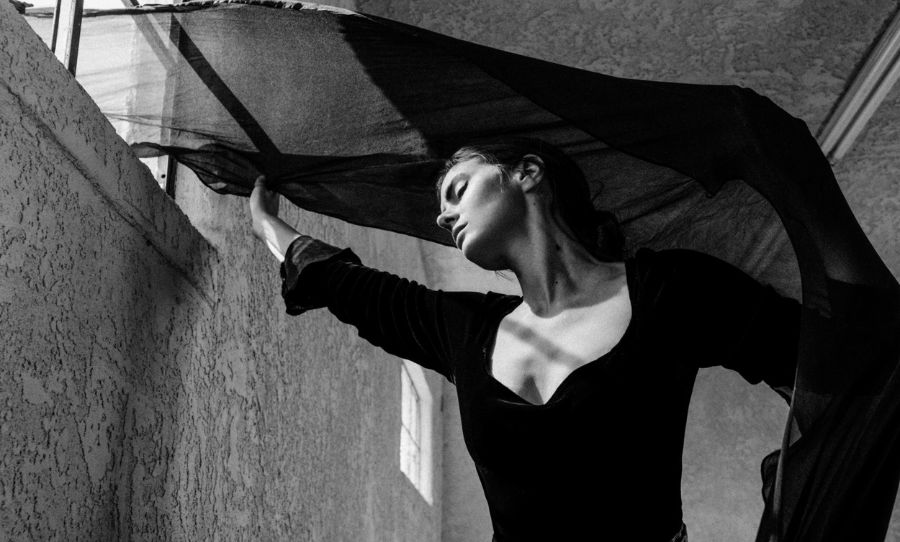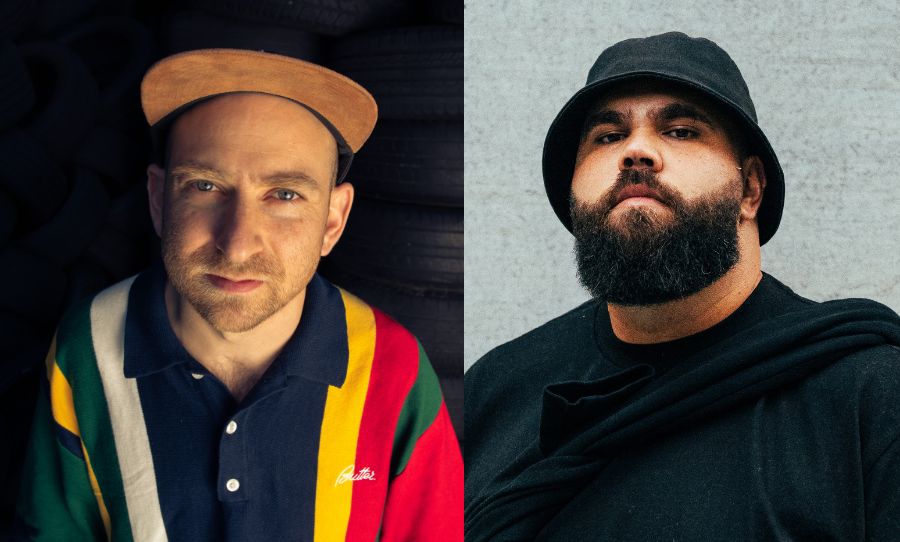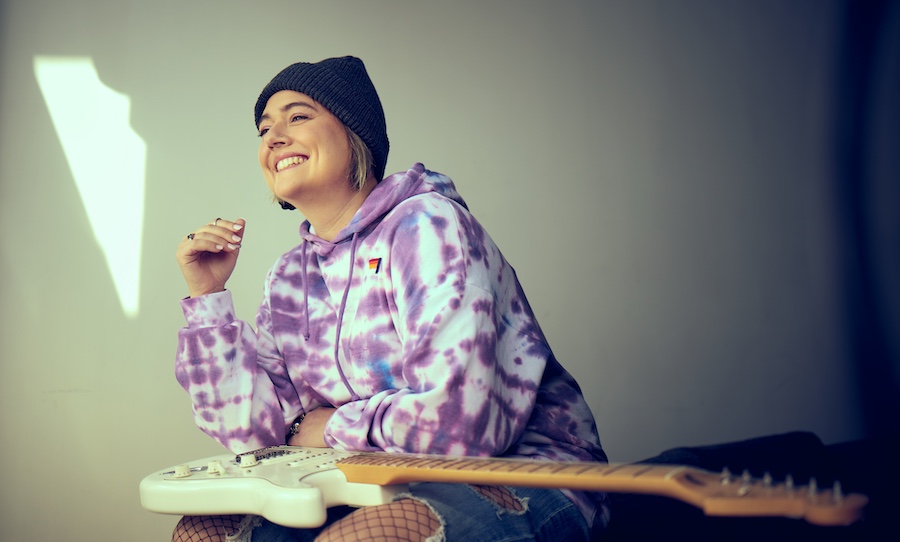On her second album Peacemaker, Vera Sola returns as an artist anew, equipped with powerful vocals and an equally powerful pen.
Vera Sola had little to prove upon the release of her sophomore album Peacemaker.
With a stunning debut already to her name in 2018’s Shades, the LA singer-songwriter had already occupied a spotlight wholly her own, making a name for herself beyond her starry surname (she is the daughter of Ghostbusters star Dan Aykroyd).

And yet, Vera Sola’s second studio effort Peacemaker arrives today (February 2) with the sheen of an artist anew.
As if propelled by the high expectations brought on by Shades, Vera Sola somehow outdoes herself with a collection of soul-baring tracks that showcases her best vocal work and storytelling to date.
Whether she’s singing along orchestral strings (Desire Path) or classic guitar (Bad Idea), or venturing to punkish corners (The Line), Sola is never outshone by her clear ear for lush soundscapes, diverse genres, and an emphasis on storytelling.
Tracing moments of life’s mundanity (Get Wise), strangeness (I’m Lying), and surreality (Hands), Peacemaker charts the topography of an artist at the height of her talent.
Below, we caught up with Vera Sola for a deep dive into the record, its genesis, and songs as “a means of catharsis through storytelling.” Catch the full interview below, and scroll down to listen to Peacemaker in all its glory.
HAPPY: What are you up to today?
VERA SOLA: I’m currently on a bachelorette filled flight to Nashville looking out at a soft carpet of clouds.
HAPPY: Tell us about where you live, what’s the scene like?
VERA SOLA: I live in Los Angeles, in an area that doesn’t feel much like Los Angeles. It’s quiet, surrounded by trees, hawks and crows battle in the sky, and owls sound all night.
View this post on Instagram
HAPPY: From “Shades” to “Peacemaker”: Can you elaborate on the shift in your creative approach, from isolation and self-recording to embracing collaboration and a larger sound? How did this impact your voice and songwriting?
It was a natural progression. My first record was made alone (though I didn’t record it myself, I had friends help me with engineering) because I was entirely new to the process and didn’t trust that I’d be able to communicate my vision to other musicians, or even to hold the necessary energetic boundaries with any outside input.
I needed to make something largely solo to prove to myself that I could do the above, thereby setting the stage for successful collaboration in the future.
It was really the process of touring that record that illuminated the magic of bringing others into the world of my music. And then, practically, I also knew there was a lot I wanted to do that I couldn’t achieve on my own in the next round.
That expansion process was reflected thematically. Shades was intentionally claustrophobic—walls caving in. Peacemaker is the opposite. Walls blowing out. I think my songwriting improved naturally with experience.
Same with my voice, it’s much stronger. I’d never properly sung before stepping into the studio to record my first album. By the time we went into the studio to record the second one, I’d really found the location of my voice in my body.
The tone is much deeper, fuller. I’ve said it before, and I’ll repeat it because it captures quite succinctly the shift: with Shades I conquered the fear of singing. With Peacemaker I confronted the true power of my voice.
HAPPY: The album draws inspiration from “New World Symphony” and surrealist westerns. How did these influences translate into the music and lyrics? Are there specific motifs or themes you explored?
VERA SOLA: I think it’s more a sensibility than anything. Sonically those two influences converge into a “widescreen” approach — big and sweeping and maximalist while twisted and strange.
Someone who worked on the album once said that they felt like they were in a fun house where each turn lead to a new mirror on reality—to walk around looking at wildly different reflections contained in the same walls and under the same roof.
I think that’s apt. I personally keep coming back to this album as the soundtrack to a surrealist film, shot in widescreen technicolor.
A series of vignettes, all taking place within the same semi-mythological landscape, played out on speakers rather than projected on a screen.
A big part of that cinematic bent is this sense of playing with perspective. Zooming in and zooming out and juxtaposing imagery and angles that are pretty untraditional.
I was also really interested in dream logic when it came to the structuring of songs and the album on a whole. There’s a warping to time and space over the whole thing.
That said, its not a concept album by any means, however tempting it is to paint it as one. The whole endeavor was more of a means of catharsis through storytelling.
View this post on Instagram
HAPPY: You describe “Peacemaker” as a “topography of memory.” Can you share an example of a song where a specific memory or place shaped the narrative and sound?
VERA SOLA: All of them really. Even the songs that aren’t about me specifically are based on some salient experience that can be anchored in a place. Sometimes a real place, sometimes a place imagined.
Street signs, certain corners, the view from out a window, or from far above the ground. So many buildings, too. Buildings are an extension of the consciousness of the characters who built or inhabit them — so especially here they’re just as much characters as the people in the songs.
HAPPY: The album tackles profound themes like loss, grief, and climate despair. How did you navigate these emotions through your music, and what message do you hope to convey to listeners?
VERA SOLA: The primary message is how critical it is to give space to these feelings—to hold them with tenderness and express them in healthy ways.
To allow for the parts of you that hurt, and to find ways to express them. The only way out is through. That’s a theological concept, too. I say this often, but look at Dante’s Inferno.
What’s the way out of hell? Into its pit, through the mouth of the beast. And what happens when you do that? When you face the fear of pain and meet it head on? The final line of the inferno. “And so we came forth and once again beheld the stars.”
View this post on Instagram
HAPPY: The title “Peacemaker” has multiple layers of meaning. How does it connect to the concept of transmuting darkness into creation, the historical gun, and your own family history?
VERA SOLA: So I’d grappled with what to name this thing since I started it. By the time my label, City Slang, came on board we’d sort of settled on ‘Instrument of War’ because, to me, that song is both the climax of the record and its thematic focal point.
But it didn’t feel quite right—and after meditating on it a while I realized I really didn’t want to put that out into the world at this particular moment—a prayer to and for war, which is what that song is.
Then the word Peacemaker came in like a shot in the dark. The Colt .45 Peacemaker is the gun that “tamed the American West.”
So it’s the original American Instrument of War, which has this thematic resonance with the thrust of the record, as well as a personal significance to my maternal family lineage of old west gun slingers.
It’s the ultimate irony. This beautiful word that wraps around something horrible. Something that’s done so much damage.
It really gets to the complexity of the music, and generally what I try to do with my art. That complexity is important to me, that staring down the darkness is important to me. With that, it’s a reclamation of the word to again make it something beautiful.
There’s the sense too, that as referenced above, I’m making peace—with all of this darkness, and all of these difficult emotions, the past and present both personal and collective—through music. As a way to transform and transmute it.
And then also, being over 4 years since I began the thing, it’s reconciling with the person I was when made it.
HAPPY: You’ve been compared to various artists like Leonard Cohen, Nick Cave, and PJ Harvey. Which artists have been most influential in your artistic development, and how do you see yourself fitting into the contemporary music landscape?
VERA SOLA: Tom Waits, Skip James, the Distillers are the ones that come to mind first. But really I just clam up because there are so many. So many influences converge to make something like what I do.
I don’t know if I fit anywhere in the contemporary music landscape and I’m not too concerned with that. I make music for myself and none-other really.
People try to peg me to a genre but I’m not sure anyone (including me) has really found the words yet. I used to be referred to as ghost-folk, which I like, but I think with this record I’ve moved beyond that characterization.
View this post on Instagram
HAPPY: Are there any plans for live performances or touring in support of the album? What kind of experience do you envision for bringing these songs to life on stage?
VERA SOLA: I’ve got two album release shows in the states, 2/14 in New York and 2/22 in Los Angeles, which will be a big band with strings.
That’ll be as close as I can get budget wise to reproducing the sound of the album since I don’t ever play with tracks. (My sense of time is too fluid.) Then we’ll have a 5 piece band for the European tour in April.
The band for this round is made up of my very favorite people on the planet. I feel tremendously lucky to have them by my side.
The most beautiful, full circle element of that is that Elvis Perkins (who I owe my music to…he asked me to play bass in his band before I ever saw musicianship in myself, and some of my first shows were opening for him) will be playing bass for me this time, and opening the US shows.
He is one of my most cherished friends and one of my greatest inspirations. So that’s wild.
HAPPY: As a multi-instrumentalist, what is your creative process like when writing and recording music? Do you start with lyrics, melodies, or instrumental textures?
VERA SOLA: It very much depends on the song and where I am in life. Some come out whole, sometimes it’s lyrics first, sometimes it a chord progression, sometimes it’s a rhythm tapped out with a pen.
With the song Blood Bond, it was the way the clothes were smacking around in the dryer.
HAPPY: What makes you happy?
VERA SOLA: Trees, plants in general, my dog, dogs on the internet, dancing, birds, my bed, my friends, big fat novels, swimming in natural bodies of water, the sun. The list is endless. I’ve become a very happy person in the past few years.



